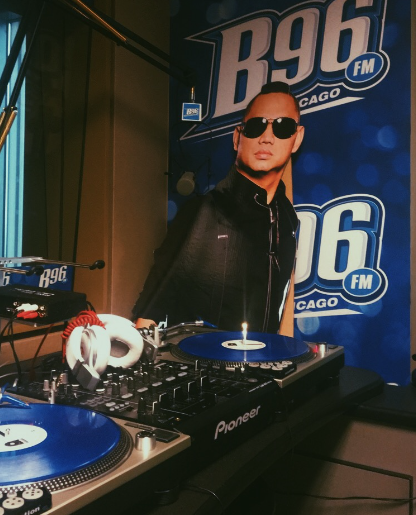INTERVIEW: Working as a Radio Personality — The Industry is Not Dead Yet with Eric Tyler

Editors Note: This piece was originally written as an informational interview assignment for the English 202: Media & Professional Writing Spring 2018 course at UIC.
By Tara Bolar
In February I won tickets to pop musician, Troye Sivan’s, private performance through Chicago’s B96 Radio Station. At the event, I met one of B96’s on-air DJ’s, Eric Tyler. After speaking with Tyler at the event, he happily agreed to an interview on an inside look of what it means to be a radio personality.
As someone who has always had an immense passion for music and interest in pop culture, the radio world has always seemed like a plausible option for my future. I currently enjoy my position on the executive board at the University of Illinois at Chicago’s (UIC) radio station, and after meeting with Tyler and getting a personal tour around a professional station, my interest in radio has been reinforced.
According to Tyler, the life of a radio personality is music based and consists of constantly keeping up with pop culture. When he is not spending time DJ'ing music on-air, Tyler is researching everything new and current in the music world as well as just being deeply engaged with life and pop culture in general.
Tyler has been working within the radio world since 1999. After finding inspiration while watching DJs perform at college gigs, Tyler applied for an internship at his college’s radio station, got a part-time job, and worked his way up from there.
Tyler explained how the professionalism of radio is more laid back compared to other fields of work. His days typically start around 1 p.m and he has the freedom to show up to work dressed as he pleases. While I was speaking with Tyler at the studio, I was able to sense the creative atmosphere and the friendly dynamic between co-workers employed at the station.
Radio is not your typical 9-to-5 office job; everyday is something brand new. Radio personalities have more independence and creative freedom to create a personal brand for themselves on-air, instead of following strict uniformed work guidelines.

One demand of working in the broadcasting industry is being flexible to move if needed. Tyler had to work at several different stations in different states before settling down at one of Chicago’s top stations. While moving can be strenuous, it is necessary in this field of work and allows for new experiences and networking to take place.
The unpredictability of the job is one of the aspects that draws me in. Some people might be uncomfortable working a job that could change day to day, but that makes me more excited to get started. One helpful piece of advice I received from Tyler is to, “get in anywhere, at any station. Start anywhere and start young.”
As stated before, when starting off in radio, it is not guaranteed that you will be at your location forever. Tyler recommends getting an early start at any station that you can get into, and then work your way up from there. If that means switching cities, states, or departments, just do it. Any and every experience will help so it is best to just jump right in. Tyler said internships and college credit is the most common way to get started, and that it is best to start while you are in college, instead of waiting till after. The sooner, the better.
Along with the independence and unpredictability of the job, another major factor that pulls me in is that it is music based. I have known since I was three-years-old that somewhere within the field of music is where I belonged.
Tyler spends his days discovering new music, playing music, attending shows, and meeting and interviewing with incredibly talented artists. When I first met Tyler, he was interviewing Troye Sivan for the station’s radio performance. While watching the interaction between Tyler and Sivan on stage, I knew that that was something I wanted to be doing. Tyler told me later in my interview with him that he is always meeting amazing new people, and I think that is a great aspect of radio.

Contrary to belief, the radio industry is not dead and it is not dying out anytime soon. A beautiful example of this that Tyler explained to me is that, “while yes, in this day in age, we have different platforms to listen to music on such as Spotify, radio is able to bring the music to life while the competitors cannot.” Radio performances and shows are still a common way for artists to promote their music and interact with fans, which is something that Spotify and Apple Music cannot offer. Radio DJs will always be needed to host these events and work with artists to get their music heard.
After having my interview with Tyler, I am still feeling confident about a possible future in the radio industry. While my dream job is still being a tour manager, radio is a plausible backup option. It allows me to still be surrounded by music while having independence, fun perks, and that allowance of keeping up with my passion in pop culture.
